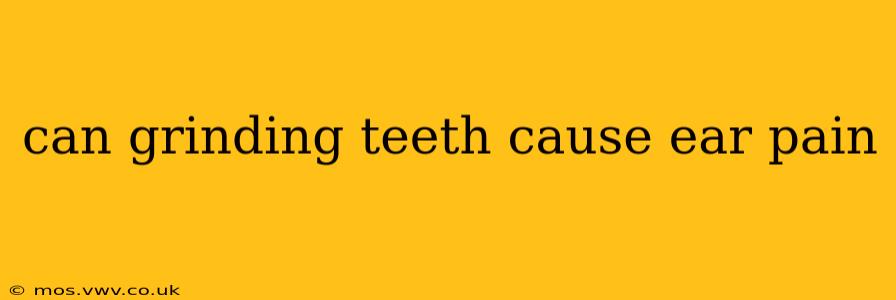Many people experience the discomfort of ear pain, and while various causes exist, teeth grinding (also known as bruxism) is a surprisingly common culprit. This article delves into the connection between teeth grinding and ear pain, exploring the underlying mechanisms and offering insights into diagnosis and treatment.
How Can Teeth Grinding Lead to Ear Pain?
The link between teeth grinding and ear pain isn't always immediately apparent, but it's a well-recognized phenomenon among dentists and otolaryngologists (ear, nose, and throat doctors). The temporomandibular joint (TMJ), which connects your jaw to your skull, plays a crucial role. When you grind your teeth, you put excessive stress on the TMJ. This can lead to inflammation and pain, not just in the jaw, but also in the surrounding areas, including the ears.
The intricate network of nerves and muscles in the head and neck region further explains this connection. Pain signals from the overstressed TMJ can radiate along these pathways, resulting in perceived pain in the ear. This referred pain can mimic other ear conditions, making accurate diagnosis crucial.
What are the Symptoms of TMJ Disorder Related to Teeth Grinding?
Recognizing the symptoms associated with TMJ disorder linked to teeth grinding is essential for seeking appropriate treatment. Besides ear pain, individuals might experience:
- Jaw pain and tenderness: This often occurs near the jaw joint, and can be aggravated by chewing or opening the mouth wide.
- Headaches: Tension headaches are frequently linked to TMJ disorders, often located in the temples or forehead.
- Neck pain: Muscle strain and tension in the neck are common, mirroring the jaw's strain.
- Facial pain: Discomfort in the cheeks or face is another common symptom, emanating from the same area as the jaw and TMJ.
- Clicking or popping sounds in the jaw: These are audible indications of dysfunction within the TMJ.
- Difficulty chewing or opening your mouth fully: TMJ problems can severely limit the range of motion in the jaw.
- Tinnitus (ringing in the ears): In some cases, individuals report a ringing sensation in their ears related to TMJ issues.
Does Teeth Grinding Always Cause Ear Pain?
No, teeth grinding doesn't always cause ear pain. Many people grind their teeth without experiencing any ear-related symptoms. The severity of bruxism and the individual's anatomical structure and pain tolerance play significant roles in determining whether ear pain develops. Some individuals have a lower pain threshold and may be more susceptible to referred pain.
How is Ear Pain from Teeth Grinding Diagnosed?
Diagnosing ear pain stemming from teeth grinding often involves a multi-pronged approach. A dentist or otolaryngologist will typically conduct a thorough examination, focusing on:
- Physical examination of the TMJ: Checking for tenderness, range of motion, and any clicking or popping sounds.
- Assessment of teeth: Examining teeth for signs of wear and tear consistent with bruxism.
- Medical history: Reviewing the patient’s history of teeth grinding, jaw pain, headaches, and other related symptoms.
- Imaging studies (if necessary): In some cases, imaging techniques like X-rays or MRI scans might be used to assess the TMJ's condition.
How is Ear Pain from Teeth Grinding Treated?
Treatment for ear pain related to teeth grinding focuses on managing the underlying bruxism and its effects on the TMJ. Common treatment options include:
- Mouthguards: Custom-fitted mouthguards worn at night can significantly reduce teeth grinding, protecting teeth and easing TMJ strain.
- Stress management techniques: Since stress is often a contributing factor to bruxism, relaxation techniques like yoga, meditation, or deep breathing exercises can be beneficial.
- Physical therapy: Specific exercises and stretches for the jaw and neck muscles can help improve TMJ function and alleviate pain.
- Medications: In some cases, pain relievers, muscle relaxants, or anti-inflammatory medications may be prescribed to manage pain and inflammation.
- Botox injections: In some cases, Botox injections can help relax jaw muscles and reduce pain.
Can I Treat Ear Pain from Teeth Grinding at Home?
While home remedies can offer some temporary relief, they shouldn't replace professional diagnosis and treatment. However, some self-care measures may help:
- Apply a warm compress to the jaw: This can help relax tense muscles.
- Practice gentle jaw stretches: These can improve range of motion and reduce stiffness.
- Avoid chewing gum or hard foods: This prevents further strain on the TMJ.
- Maintain good posture: Good posture reduces unnecessary strain on the neck and jaw.
This information is for educational purposes only and should not be considered medical advice. If you experience persistent ear pain or suspect it's related to teeth grinding, consult a dentist or otolaryngologist for proper diagnosis and treatment. Early intervention can often prevent more significant complications.
